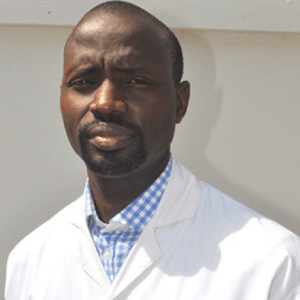 Our Immunologist of the month is Assistant Professor Babacar Mbengue based at the University Cheikh Anta Diop, Senegal. Our Immunopaedia ambassador Mahaman Moustapha Lamine conducted this interview.
Our Immunologist of the month is Assistant Professor Babacar Mbengue based at the University Cheikh Anta Diop, Senegal. Our Immunopaedia ambassador Mahaman Moustapha Lamine conducted this interview.
Name: Babacar Mbengue
Position: Assistant Professor at the faculty of Medicine, Pharmacy and Dentistry, University Cheikh Anta Diop of Dakar-Senegal
Research Interests: My first research interest focuses on understanding the immuno-genetics of malaria. The second focusses on gynaecological and breast cancer.
What immunological activities are you involved in? We are working on the immuno-genetic aspects of antimalarial immunity. The aim of this research is to determine which Plasmodium falciparum antigens can be used to develop candidate vaccines and improved diagnostic tools.
I also conduct research in the field of cancer, the aim of this research is to develop biomarkers that we can use to survey the impact of radiotherapy and chemotherapy on the immune system. In addition, we are also interested in autoimmune diseases particularly lupus erythromatous.
Why do you work in immunology? I want to contribute to the evolution of immunology in Africa. My objectives are to participate in research for the well being of the populations of Senegal and Africa, and generate knowledge that will contribute to teaching of immunology in Africa.
What have been your biggest difficulties conducting research? One of the major challenges of conducting research in Africa is the lack of will and quality of human resources. Without this, the capacity to conduct impactful research is reduced due to limited support, as researchers often have to take on administration duties to ensure that their research runs smoothly. Another challenge is limited funding.
What is the best advice or recommendations for young scientist in sub-Saharan Africa? My advice for the young scientists is to have perseverance in research and develop south-south collaboration. Because if you are not persevering, you will not ensure that scientific research conducted on the continent will benefit of the livelihood of those affected. On the side of the collaboration, we will have to favour the south-south collaboration because no one can move alone and we need to ensure maximal benefit of those affected as well growth of our research capacity.
Why do you think basic research in immunology is important? The research in the field of immunology by Africans is very important because many infectious diseases still occur in Africa. We need research in immunology to find vaccines, therapeutic and diagnostic tools for our populations. For this to be achieved, basic research in immunology is essential.
What will be your contribution to the development of immunology in Africa? We want to transform knowledge into useful tools for the well being of population health. We also want to simplify the teaching of immunology and contribute to the training of young scientists.
Original audio interview in French
Interview by Mahaman Moustapha Lamine










